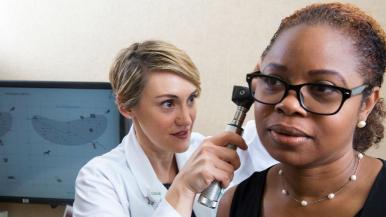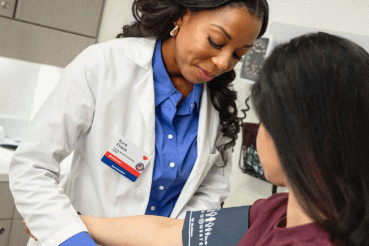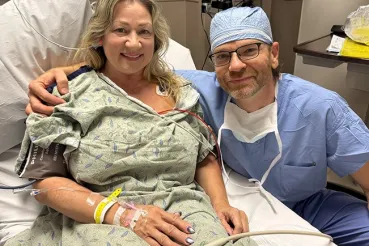Telehealth has recently grown in popularity, and now it’s audiology’s turn to embrace its potential.
Rush is hosting the fifth International Meeting on Internet and Audiology, which will run from May 3- 6. The online conference will explore ways to use internet-based methods to improve health outcomes for audiology patients.
The meeting brings together more than 550 clinicians, researchers, and students from 30 countries. The four main themes of the meeting are patient-centered care and eHealth, social media and hearing care, online audiologic rehabilitation, and implementation of teleaudiology services.
The meeting chair, Valeriy Shafiro, PhD, is an associate professor in the Department of Communication Disorders and Sciences at Rush University. He wants to see the meeting consider the ways audiology can be more accessible and widespread for a wide range of people who can’t get hearing care in person.
“Online applications can help audiologists reach more patients and offer guidance so people feel empowered to get the help they need,” he says. “But technology cannot replace human connection. “It is there to help us maintain those connections we have with one another.”
The World Health Organization’s 2021 report estimates that more than 1.5 billion people, nearly 20% of the world population, are currently experiencing some degree of hearing loss, with approximately 430 million expected to require treatment. Complicating the problem further is the dearth of audiology services in many places they are needed.
Providing services online may be one way to decrease the global burden of hearing loss and to reach individual patients. The good news is that in recent times during the COVID-19 pandemic, telehealth has gained much wider adoption, and Shafiro now sees teleaudiology as a way to expand care for those with hearing loss.
Many people with hearing loss are in economically disadvantaged countries, Shafiro says, where teleaudiology could provide unprecedented access to care. Aging populations in wealthier countries could also benefit from remote online care. And there’s also immediate importance for the general public. According to a recent article in the Lancet referenced by Shafiro, untreated hearing loss in middle age is the largest modifiable risk factor for later dementia.
Shafiro believes this meeting will help build professional and research networks, and bring greater awareness of existing and developing teleaudiology practices to clinicians, who will be able to better assist their patients through internet-based treatment and monitoring.
“One of the projects we've had in my lab is developing online tests for evaluating speech perception, speech comprehension, perception of environmental sounds, perception of music and auditory pattern processing,” Shafiro says.
His lab’s work so far has been focused on people with cochlear implants, but he’s confident he can extend this model to other populations with hearing loss. It’s exactly the type of project relevant to this year’s meeting.
Other Rush clinicians, researchers and students will be presenting at this year’s meeting. Megan Worthington, AuD, a clinical manager in the Department of Communication Disorders and Sciences, along with one of her students, Kristen Petrarca, has developed protocols for both in-person hearing aid fittings and online follow up. Worthington also heads up Rush’s SCOPE program (Student Community Outreach Program of Excellence) to distribute hearing aids to those in Chicago who need them. Their protocols will help people manage their own hearing care remotely.
Another SCOPE project, led by Rush faculty Mitchell Frye, AuD, and Kate Dunckley, PhD, and presented at the meeting by current audiology student Tara Waller is focused on developing online training modules to make hearing loss screening accessible to more people. It is expected that physician who complete the modules would be able to detect hearing loss earlier (and thus address it sooner), since often it’s a patient’s personal doctor who identifies hearing loss first.
The meeting will also expose Rush students to many recent innovations in teleaudiology and inform the development of audiology curricula.
“Hearing loss is such a widespread issue affecting so many people in the Rush community, in the U.S. and around the world,” Shafiro says. “The International Meeting on Internet and Audiology is critically important for helping teleaudiology go mainstream.”




